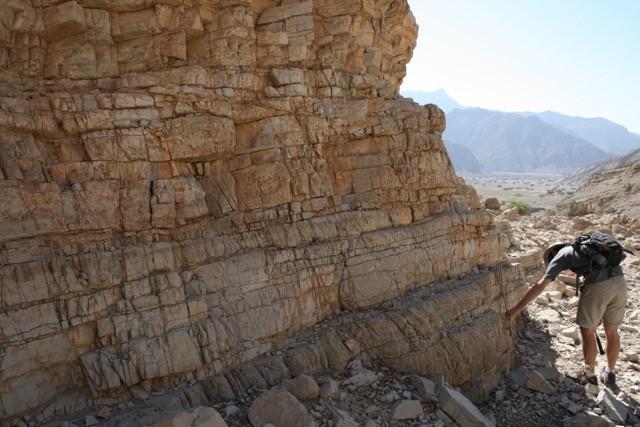Why life on Earth took 5 million years to recover from the greatest mass extinction

A new study conducted by the researchers from the University of Edinburgh, Leeds, Gratz, Bremen, and Vienna, reveals why the recovery of life on Earth from the greatest mass extinction event that occurred during the Permian-Triassic Boundary, was delayed for five million years.
The mass extinction event happened about 252 million years ago, wiping out over 90% of marine life and about two-thirds of animals residing on land, as Earth's oceans became starved of oxygen, which caused the several million years long delay in recovery.
.jpg)
Analysis of rocks in Oman that were formed in an ancient ocean around the time of Earth's greatest mass extinction have helped explain why life on Earth took so long to recover. Image credit: Matthew Clarkson
Previously conducted research suggested the mass extinction and delayed recovery were influenced by the anoxic waters that contained high levels of harmful sulfides. However, scientists think the anoxic conditions were more complex, and that the toxic, sulfide-rich state didn't affect all the oceans around the globe.
The team used chemical techniques to analyze the rock samples from Oman, formed in an ancient ocean around the time the extinction occurred. The data from six shallow sites showed that, although the water did lack oxygen, the toxic sulfide was not present, and the ocean was abundant in iron.This suggests that iron-rich, low oxygen water caused the delay in recovering the marine life from the mass extinction.
.jpg)
Analysis of rocks unearthed in Oman that were formed in an ancient ocean around the time of Earth's greatest mass extinction have helped explain why life on Earth took so long to recover. Image credit: Matthew Clarkson
The oxygen levels were different at various ocean depths. Some levels, low in oxygen, restricted the marine life recovery while shallower levels, containing higher amounts of oxygen, supported different life forms to develop during short time spans. However, the exact cause of the observed delay is still not clear. According to researchers, the increased run-off from rock erosion, caused by high global temperatures, have likely triggered anoxic conditions in the water.

Analysis of rocks unearthed in Oman that were formed in an ancient ocean around the time of Earth's greatest mass extinction have helped explain why life on Earth took so long to recover. Image credit: D. Astratti
"We knew that lack of oxygen in the oceans played a key role in the extinction and recovery processes, but we are still discovering how exactly it was involved. Our findings about the chemistry of the ocean at the time provide us with a clearer picture of how this complex process delayed the recovery of life for so long," said Dr. Matthew Clarkson, the leader of the study of the University of Edinburgh's School of GeoSciences.
"The neat point about this study is that it shows just how critical an absence of oxygen, rather than the presence of toxic sulfide, was to the survival of animal life. We found that marine organisms were able to rapidly recolonize areas where oxygen became available," added Professor Simon Poulton, of the University of Leeds, a co-author of the study.
Reference:
- "Dynamic anoxic ferruginous conditions during the end-Permian mass extinction and recovery" – M. O. Clarkson, R. A. Wood, S. W. Poulton, S. Richoz, R. J. Newton, S.A.Kasemann, F. Bowyer & L. Krystyn – Nature Communications (2016) – doi:10.1038/ncomms12236
Featured image: Analysis of rocks unearthed in Oman that formed in an ancient ocean around the time of Earth's greatest mass extinction have helped explain why life on Earth took so long to recover. Image credit: D. Astratti

Commenting rules and guidelines
We value the thoughts and opinions of our readers and welcome healthy discussions on our website. In order to maintain a respectful and positive community, we ask that all commenters follow these rules.